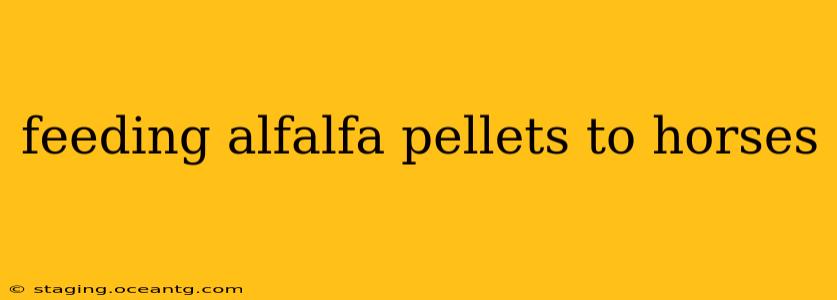Alfalfa, a nutritional powerhouse, is a staple in equine diets worldwide. While alfalfa hay is common, alfalfa pellets offer distinct advantages and considerations for horse owners. This comprehensive guide will explore the benefits, drawbacks, and best practices for feeding alfalfa pellets to your equine companion.
What are Alfalfa Pellets?
Alfalfa pellets are created by processing dehydrated alfalfa hay into compressed, small cylindrical shapes. This process significantly increases the density of the feed, meaning a smaller volume delivers a higher concentration of nutrients. This makes them a convenient and efficient way to supplement a horse's diet, especially for horses with limited hay intake or those requiring specific nutritional support.
Benefits of Feeding Alfalfa Pellets to Horses
- High Nutritional Value: Alfalfa is rich in protein, calcium, and other essential vitamins and minerals crucial for maintaining a horse's overall health and well-being. Pellets retain these nutrients effectively.
- Convenient Storage and Handling: Pellets are less bulky and easier to store than loose hay, saving valuable space in your barn. They're also less susceptible to spoilage and waste.
- Controlled Feeding: Pellets allow for precise measurement of feed intake, making it easier to manage weight and address specific dietary needs. This is particularly helpful for horses prone to obesity or those recovering from illness.
- Improved Palatability (Sometimes): Some horses find the concentrated and uniform texture of pellets more appealing than hay, especially older horses with dental issues. However, this isn't always the case.
- Reduced Waste: The compact nature of pellets minimizes waste compared to loose hay.
Drawbacks of Feeding Alfalfa Pellets to Horses
- High Calcium Content: Alfalfa's high calcium content can be detrimental to horses prone to urinary tract issues like calcium oxalate stones. Careful monitoring and potentially adjustments to the overall diet are essential.
- Potential for Digestive Issues: The dense nature of pellets can lead to impaction colic in some horses if not introduced gradually and fed appropriately. Always ensure adequate water intake.
- Cost: Alfalfa pellets can be more expensive than loose hay, particularly in certain regions.
- Not a Complete Diet: Pellets should never replace hay as the primary source of roughage in a horse's diet. They should be used as a supplement.
- Dust: While less dusty than some hays, some horses may be sensitive to the dust produced by pellets.
How Much Alfalfa Pellets Should I Feed My Horse?
The appropriate amount of alfalfa pellets depends on several factors, including your horse's age, size, activity level, body condition, and overall dietary needs. Consult with your veterinarian or an equine nutritionist to determine the ideal feeding schedule and amount for your horse. A gradual introduction of pellets is crucial to avoid digestive upset.
What are the best practices for feeding alfalfa pellets?
- Gradual Introduction: Start by offering a small amount of pellets and gradually increase the quantity over several days to allow your horse's digestive system to adjust.
- Adequate Water: Ensure your horse has access to fresh, clean water at all times. Increased water intake is crucial when feeding pellets due to their higher density.
- Monitor for Changes: Closely monitor your horse's weight, manure consistency, and overall health after introducing pellets. Any signs of digestive distress should be addressed immediately.
- Combine with other Feeds: Alfalfa pellets are best used as a supplement to a balanced diet that includes hay as the primary forage source.
- Storage: Store pellets in a cool, dry place to prevent spoilage and maintain their nutritional value.
Can I feed alfalfa pellets to all horses?
No. Horses with certain conditions, such as those prone to urinary calculi or those with specific metabolic disorders, might not benefit from a diet high in alfalfa. It's crucial to consult with your veterinarian or equine nutritionist before incorporating alfalfa pellets into your horse's diet, especially if they have pre-existing health conditions.
What are some alternatives to alfalfa pellets?
Various other feeds can supplement a horse's diet. These include other legume pellets (like clover), grass pellets, or commercially available equine supplements formulated to address specific nutritional deficiencies. Again, consultation with a veterinarian or equine nutritionist is recommended.
This guide provides a comprehensive overview of feeding alfalfa pellets to horses. Remember, every horse is unique, and their dietary needs vary. Always consult with your veterinarian or an experienced equine nutritionist to create a tailored feeding plan that ensures your horse's optimal health and well-being.
